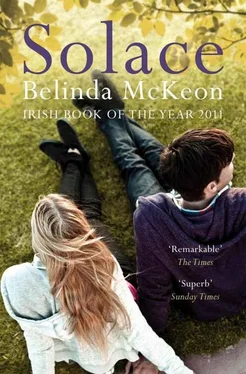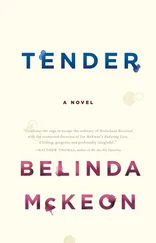‘Of course, I’ll be done with my traineeship soon,’ she said. ‘I’m hoping then to get into a firm that works more directly in the areas that interest me.’
She expected him to ask what those areas were, but he did not. His interest in things seemed as thinned as his body was. She felt suddenly intensely sorry for him. There was no way he could not realize how much he had changed in himself, how diluted the energies of his mind had become. As though the shelves of a library had been ransacked. It’s not fair, she thought, and for a moment she thought she might even say this to him, but it was out of the question. It would not help in any way. It would embarrass them both, and he would look at her. . he would look at her, she thought, much as he was looking at her right now. Was she imagining it? That he was looking at her so knowingly, with something so much like tolerance? As though he could hear or read what had been going through her mind? He had always seemed capable of that. She told herself to snap out of it, to stop wallowing in this nonsense, and she found that he was still regarding her, and smiling at her, in exactly the same way.
‘You’re interested in family law, I recall,’ he said, and she was taken aback. He had remembered. So his memory was not the wreck she had imagined; he was not the poor senile old dear she had been picturing and so energetically pitying. He was just as sharp, just as good on the small details of other people’s lives as he had ever been, even if he had shown no interest in the man who had fathered her baby. Maybe he simply had good manners, she told herself. Maybe he just knew when to keep his nose out of things that were none of his concern.
‘And now here you are,’ he said then. ‘Here you are with a family all your own. Isn’t it strange? After all?’
She waited for something, some nub of wisdom, to follow in the wake of this, but there was nothing. He looked now as though he might be growing sleepy in the sun. But then he shook himself and sat up.
‘You heard, of course, that the woman on Fitzwilliam Square sold up?’ he said, in a much more strident tone.
Joanne considered pretending not to know who he meant. But it was obvious. ‘Elizabeth Lefroy sold the house?’ she said.
‘Yes.’ Robinson nodded. ‘I think for a huge sum. You know how much those houses are selling for these days.’
‘I didn’t know,’ Joanne said, almost stammering.
‘I imagine the legal fees would have been significant,’ Robinson said. He glanced her way. Joanne felt prodded on to the defensive.
‘Well,’ she said, ‘hardly to the tune of that kind of amount.’
‘I expect there would have been some profit,’ Robinson said mildly, glancing to the lawn. ‘But then again, I imagine that the woman just wanted to get away. In light of what had happened, I imagine she could no longer be happy in that house.’
‘No longer quite at home.’
Robinson looked to her. ‘I’m sorry?’
Joanne shook her head. ‘Something from her testimony. I remember noticing it at the time. Sorry,’ she said, as though she had interrupted him.
‘Yes, that is a nice phrase,’ Robinson said, his hands laid flat on his thighs. How thin his legs were. ‘A very nice way of putting it indeed. And true too, I imagine. True too.’
‘It was all very sad, what happened,’ Joanne said, and he looked at her kindly.
‘Oh, it was far from your fault, my dear,’ he said, patting her hand. ‘When you get to your family law, there’ll be time enough for it to be your fault.’ He smiled, showing his slightly browned teeth. ‘So you go easy on yourself until then.’
Aoife was asleep now in the pushchair. Joanne tried to see her through Robinson’s eyes. The red hair, that was from way back on her side, she imagined telling him. The full lips: those were Mark’s. The nose was Joanne’s, and the pale skin too. The striped tights and the purple suede booties and the corduroy dress with the green cat stitched into it somehow suggested a more colourful life, a life of more treats and more excitement than was actually the case; they were all gifts from friends, and Aoife had never worn them before. Joanne had chosen them in the bedroom that morning, for their big day out. And the way she had thrown her head back in sleep, the way she had flopped her hands forward, that was the absolute surrender that made Joanne want to pick her up and carry her everywhere for the rest of her life. That was the ability to trust that she must have inherited from somewhere deep inside her father, because it was not anywhere on her father’s surface, and it was not anywhere in her mother at all. And that’s my daughter, Joanne imagined herself saying to Robinson, but he was not even looking at the child now: he was staring over to the arts block, to its cement terraces blotched with the varying darknesses of age and wear. And it was time to go home, with the green cat, and the purple booties, and the little hands thrown down like rejected toys. Beside her, Clive Robinson looked ready to fall asleep himself, to doze off right there, and to stay until someone came and found him, until with a nudge someone woke him — what would they call him? Professor? Darling? Dad? — and took him home.
‘We’d better go,’ Joanne said, calling him nothing at all.
‘Of course you must,’ said Clive Robinson, and he stood with her and kissed her cheek, and on his breath she smelt the thing she had imagined to be happening to his mind. And though she wished he would sit down again, and not tire himself, he stood and watched and waved as she walked away, until she had gone around the corner of the old library and out of his sight.
She searched her bookshelves for it that evening after she had put Aoife to bed for the night. She had loved it in college; she had read it several times. She found it on the bottom shelf, hidden under an old photo album. She poured herself the last of the wine that Deirdre and Sarah had brought the previous evening, and she curled up on the couch. Her phone beeped and she read the new message from Mark, Having good time. How is Aoife? , and she texted back to say that Aoife was asleep and that she was reading. Xx , he texted back, and she thought of the note she had written on his Edgeworth book, and wondered if he had found it yet. She put the phone down. She opened Robinson’s book. She turned to the first line. Never are the philosophical problems of identity and difference so poignantly formulated as when they bear on the dimensions of social life , she read, and she saw how she had underlined the sentence several times, in different colours; how she had pushed at its meaning for herself again and again. What does it mean to belong to a family, to a group of friends, to an organization? she read. How is it possible to say ‘we’? Who counts as a stranger? What is it to be truly conscious of ourselves, let alone of someone else?
Joanne looked at the words, and she looked at the traces of herself as she had been years previously, reading them, noting them, needing them. She needed them now, she felt; she needed them once again, but she did not know how. She did not know why. She read on, but the rest of the paragraph pulled her into territory that she was no longer certain how to traverse. As they always did now, the words began to slip from their moorings. The sentences began to slide off a ledge. She went back to those first lines and used them to steady her grip. She let them lead her on. After a couple of pages, as she had known they would, her eyes began to close. She went upstairs, taking the book with her. In the room, Aoife’s nightlight was throwing coloured stars to the ceiling, like confetti to a summer sky. She left it on. Some time during the hours to come, it would turn itself off.
Читать дальше












